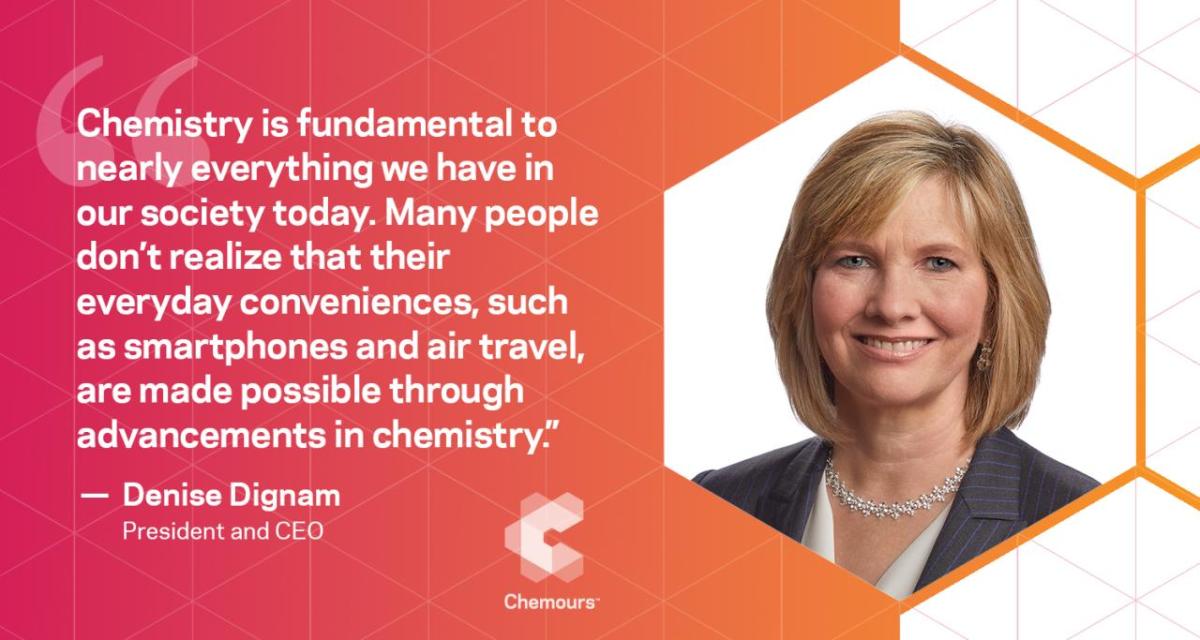An Interview With Denise Dignam, President and CEO, Chemours
The semiconductor industry is incredibly precise, with even the smallest impurity having the potential to disrupt production. That’s why we’ve focused on innovation to ensure our materials meet the highest standards of purity.

Originally published by Investment Reports
Could you provide an overview of what's currently happening at Chemours, especially regarding your transition to the CEO role?
Things are going very well at Chemours, especially from a cultural standpoint. The disruptions we faced were isolated incidents involving a few people and did not affect the entire company. My transition has been overwhelmingly supported by the organization, as I have been with Chemours and its predecessor for 36 years. Being a chemical engineer by training, my background brought comfort to the company during this leadership change. Upon my arrival, we took the opportunity to reset our values and engaged the entire organization, with 2,400 employees participating in shaping our new values, focusing on safety, integrity, partnership, ownership, and respect.
How has the demand for performance materials shifted, particularly within the semiconductor industry, and what role does Chemours play in this?
We recognize the growing trend of bringing manufacturing capabilities back to the U.S., especially in the semiconductor industry – we’re the only domestic manufacturer of a critical material, PFA resin. This shift presents a major opportunity for us due to our expertise in producing products with the highest levels of purity, which is critical for semiconductor manufacturing. Whether it's in lithography tools or the chemical distribution systems used in chip fabrication, the quality of our materials plays a vital role in ensuring chip production efficiency and improving yields for our downstream customers.
We've also invested heavily in understanding our customers' evolving needs. The semiconductor industry is incredibly precise, with even the smallest impurity having the potential to disrupt production. That’s why we've focused on innovation to ensure our materials meet the highest standards of purity. Our goal is to continue driving productivity improvements for our customers by closely listening to their requirements and pushing forward in our research and development efforts.
Do you anticipate the chemical industry's R&D investment increasing as companies target high-value segments like semiconductors?
While some segments of our business, such as the titanium dioxide (TiO2) division, don’t require significant product innovation, we are investing heavily in the areas where we see growth potential. For example, we built a state-of-the-art facility on the University of Delaware’s STAR campus, focusing on clean energy technologies like hydrogen, fuel cells, and flow batteries. Most recently we invested millions into a new battery lab to enable more sustainable, cost-effective, energy-efficient, and high-performing batteries for hybrid and electric vehicles. This focus on innovation is crucial for staying competitive in high-growth sectors. While it might seem like a smaller percentage when compared to some other industries, our investments in advanced electronics and energy solutions are substantial and reflect our commitment to staying at the forefront of the industry.
Can you tell us more about some of the next-generation technologies Chemours is developing, such as for advanced lithography processes and liquid cooling for data centers?
One of the most exciting areas we are working on is two-phase immersion cooling for data centers, which is quickly becoming viewed as the future of cooling. Today, most data centers rely on air cooling, but we’ve developed a fluid in which entire servers are immersed. Our immersion cooling lab has been running tests with our Opteon™ 2P50 developmental fluid for over two years now without experiencing the degradation or hardware corrosion current liquid cooling solutions face. We’ve tested our fluid rigorously to ensure its reliability, even under challenging conditions. Beyond liquid cooling, we’re also innovating in our technologies that serve the semiconductor industry. For example, we’ve expanded our manufacturing capabilities at our Washington Works site to further support domestic semiconductor production. Our team recently launched a new production line for high-quality Teflon™ PFA materials used in semiconductors, and the results have been fantastic. We’re also working on advancing cable materials that can handle the demands of transmitting data quickly while withstanding heat and corrosive environments, making us a critical player in the high-speed data center and high-performance computing supply chain.
What is the role of chemistry in today’s world, and how important is it for people to understand its impact?
Chemistry is fundamental to nearly everything we have in our society today. Many people don’t realize that their everyday conveniences, such as smartphones and air travel, are made possible through advancements in chemistry. It is the foundation of countless innovations, and that connection between modern technology and chemical science needs to be better understood. I often find myself talking about chemistry at social events because I believe in spreading that awareness.
The chemicals industry is often two steps removed from the consumer, but its impact is far-reaching. Companies like INEOS in the UK have done a great job educating the public on this, and we should continue that effort globally. By emphasizing how chemistry drives progress, we can foster greater appreciation and understanding of its role in modern life.
How does Chemours stay ahead of its clients' future needs, particularly in industries like semiconductors?
It is crucial to not only respond to current needs but also to anticipate future trends. At Chemours, we connect with a wide range of stakeholders, including not just our direct and downstream customers, but industry groups, universities, startups, and national laboratories, to stay ahead of industry shifts. We have dedicated roles within the company that focus on understanding trends and aligning our innovation strategy with future demands, particularly in sectors like semiconductors, where technology is constantly evolving. In addition to short-term planning, we also engage in long-term forecasting, looking 10 years ahead to ensure we remain competitive. This requires balancing the immediate pressures of being a public company with the need to invest in long-term strategies, such as our corporate responsibility commitments set in 2018. These commitments, aimed at addressing sustainability and innovation, have proven to be incredibly forward-thinking, reinforcing the importance of having a clear, long-term vision.
What is currently keeping you up at night regarding Chemours' operations?
One of the biggest concerns is regulatory overreach, particularly the lack of alignment between different regulatory bodies. It’s not just a U.S. issue; we see it globally, especially in Europe. There’s often a disconnect between government policies aimed at fostering growth, such as the CHIPS Act or the Inflation Reduction Act, and the actual execution of these policies by regulatory agencies. This misalignment creates hurdles for companies like ours, making it difficult to secure permits and move forward with projects that are critical for supply chain resilience. This lack of coherence between economic development and regulatory frameworks introduces uncertainty, which can hinder long-term investments. For manufacturers, it is challenging to commit to projects when policies could drastically change with new political leadership.
How important is supply chain resilience to Chemours' partners, particularly in the semiconductor industry?
Supply chain resilience is one of the top concerns for our partners, particularly in high-tech industries like semiconductors. It is critical to ensure that materials are available locally and that we can provide the certainty and quality needed to keep production on track. The President and CEO of industry group SEMI recently highlighted supply chain resilience as one of the top four issues facing the industry, and we agree wholeheartedly. The regionalization of supply chains and the uncertainty caused by global disruptions make it essential for companies like Chemours to establish reliable, local supply networks.
What are some of the key milestones Chemours is aiming for in the coming year, particularly regarding innovation?
We are expecting significant progress on our strategic initiatives, particularly in the area of advanced cooling technologies for data centers. One of our exciting innovations is two-phase immersion cooling developmental fluid that not only reduces cooling energy use by more than 90% when compared to conventional air cooling, but also nearly eliminates water usage and cuts footprint size significantly. This technology addresses key challenges in data center management and we’re moving toward a commercial production plan. In addition to that, we are continuing to focus on other key areas, including next-generation refrigerants, advanced electronics, and clean energy solutions.
Continue reading here.

